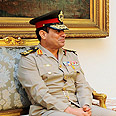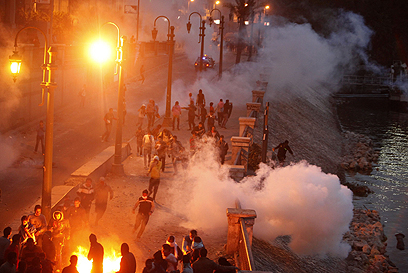
Egypt's army chief said political strife was pushing the state to the brink of collapse – a stark warning from the institution that ran the country until last year, as Cairo's first elected leader struggles to contain bloody street violence.
Defense Minister Gen. Abdel Fattah al-Sissi, appointed by Egyptian President Mohamed Morsi last year to head the military, added in a statement on Tuesday that one of the primary goals of deploying troops in cities on the Suez Canal was to protect the waterway that is vital for Egypt's economy and world trade.
Related stories:
- Egypt: Clashes resume despite emergency decree Egypt unrest: Morsi declares state of emergency
- Egypt: 30 dead in riots over stadium disaster verdict
Al-Sissi's comments, published on an official army Facebook page, followed 52 deaths in the past week of disorder and highlighted the mounting sense of crisis facing Egypt and its Islamist head of state who is struggling to fix a teetering economy and needs to prepare Egypt for a parliamentary election in a few months that is meant to cement the new democracy.
The comments are unlikely to mean the army wants to take back the power it held, in effect, for six decades since the end of the colonial period and in the interim period after the overthrow of former general Hosni Mubarak two years ago.
But it sends a powerful message that Egypt's biggest institution, with a huge economic as well as security role and a recipient of massive direct US subsidies, is worried about the fate of the nation after five days of turmoil in major cities.
"The continuation of the struggle of the different political forces… over the management of state affairs could lead to the collapse of the state," said General Abdel Fattah al-Sissi, who is also defense minister in the government Morsi appointed.
He said the economic, political and social challenges facing the country represented "a real threat to the security of Egypt and the cohesiveness of the Egyptian state" and the army would remain "the solid and cohesive block" on which the state rests.
Political opponents spurned a call by Morsi for talks on Monday to try to end the violence. Instead, huge crowds of protesters took to the streets in Cairo and Alexandria, and in the three Suez Canal cities – Port Said, Ismailia and Suez - where Morsi on Sunday imposed emergency rule and a curfew.
'Down, down Morsi'
Residents in the three canal cities demonstrated overnight in defiance of the curfew. At least two men died in fighting in Port Said, raising to at least 42 people who have now been killed there, most of them by gunshot wounds.
"Down, down with Mohamed Morsi! Down, down with the state of emergency!" crowds shouted in Ismailia. In Cairo, flames lit up the night sky as protesters set vehicles ablaze.
The demonstrators accuse Morsi of betraying the two-year-old revolution. Morsi and his supporters in the Muslim Brotherhood accuse the protesters of seeking to overthrow Egypt's first ever democratically elected leader by undemocratic means.

Protest in Port Said (Photo: AFP)
Debris from days of unrest was strewn on the streets around Cairo's Tahrir Square, cauldron of the anti-Mubarak uprising.
The Egyptian army has already been deployed in Port Said and Suez and the government agreed to a measure letting soldiers arrest civilians as part of the state of emergency.
The instability has provoked unease in Western capitals, where officials worry about the direction of a powerful regional player that has a peace deal with Israel. The United States condemned the bloodshed and called on Egyptian leaders to make clear violence is not acceptable.
Morsi's invitation to rivals to hold a national dialogue with Islamists on Monday was spurned by the main opposition National Salvation Front coalition, which described it as "cosmetic".
The only liberal politician who attended, Ayman Nour, told Egypt's al-Hayat channel after the meeting ended late on Monday that attendees agreed to meet again in a week.
He said Morsi had promised to look at changes to the constitution requested by the opposition but did not consider the opposition's request for a government of national unity.
Morsi's pushing through last month of a new constitution which critics see as too Islamic remains a bone of contention.
- Receive Ynetnews updates
directly to your desktop















